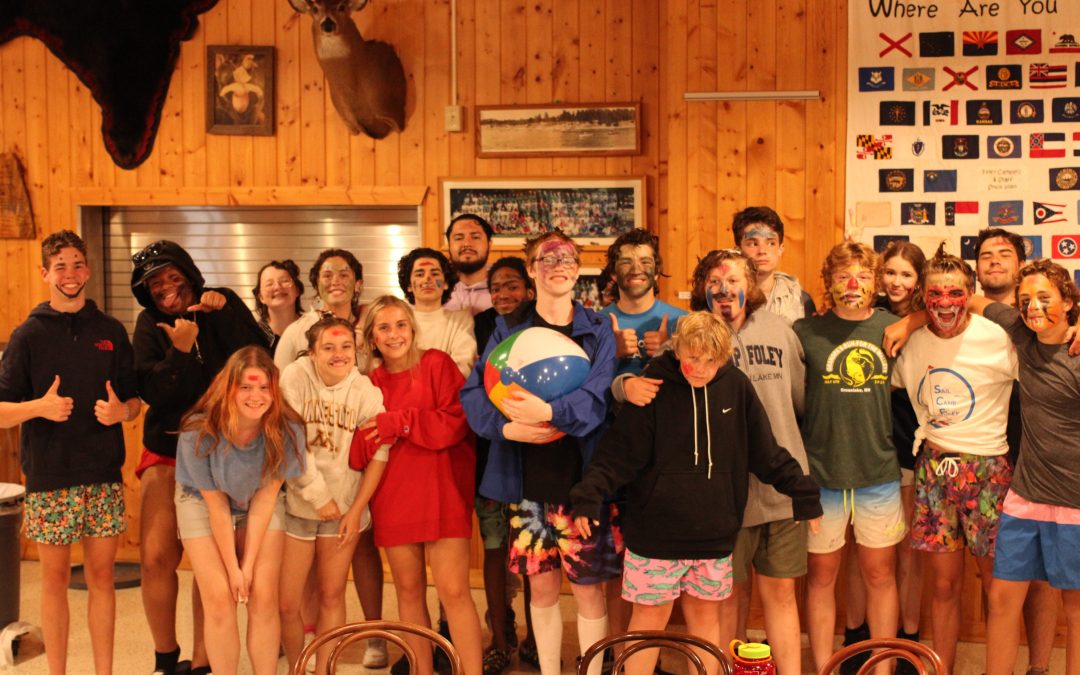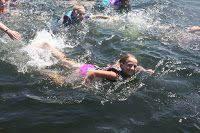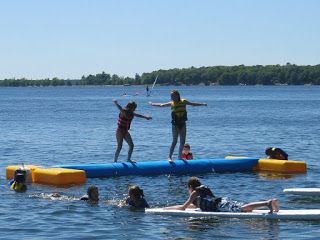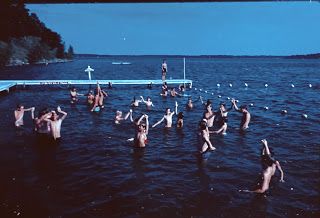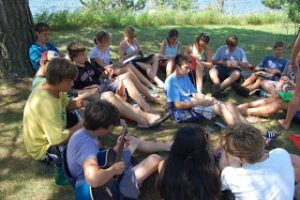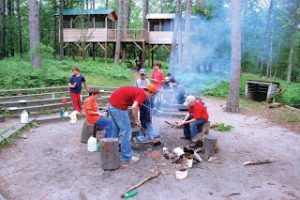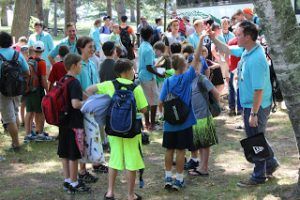Are you looking for a fantastic summer experience for your child? Look no further! Kids summer camp offers an incredible array of benefits, from creating lifelong friendships to developing new skills and boosting confidence. In this blog post, we’ll explore the various types of kid’s summer camps, their benefits, age-appropriate activities, financial assistance options, and tips for choosing the perfect camp for your child. Let’s dive in!
Key Takeaways
- Summer camps offer a range of exciting activities for all ages and interests, from day to overnight.
- Attending summer camp provides many benefits, such as developing social skills, and gaining confidence and self-reliance through new experiences.
- Choosing the right summer camp is easy with evaluating programs, seeking recommendations & visiting camps!
Types of Summer Camps
Many children associate summer with camp. With so many options available, it can be challenging to choose the right one for your child. There are three main types of summer camps: day camps, overnight camps, and specialty camps. Each type offers unique features and experiences for different age groups, catering to a wide range of interests and needs. Camp Foley, for example, is a co-ed boys and girls overnight summer camp for kids ages 7-16.
Young campers looking for daytime fun would find day camps ideal, with themed weeks, age-appropriate activities, and a focus on social and character development. Contrastingly, overnight camps promise immersive experiences in diverse settings, featuring an array of thrilling activities from swimming and canoeing to hiking, archery, and beyond. Passionate campers with specific interests such as sports, arts, or STEM-focused programs, can enjoy tailored sessions at specialty camps.
Day Camps
Families seeking daytime fun and engaging activities for their kids, which still allow them to return home each evening, would find day camps an excellent choice. These camps often feature exciting theme weeks, outdoor adventures, and skill-building opportunities, from sports to arts and crafts.
Day camps provide a nurturing and supportive environment for children to flourish and make new friends while giving them the comfort of spending evenings with their families and in their own bed.
Overnight Camps
Overnight camps provide an unforgettable experience for kids and teens, fostering independence and lasting memories. Typically lasting between one to eight weeks, (our Camp Foley sessions include a 2-week, 3-week, and 5-week options) these overnight camp experiences offer a variety of exciting activities, from performing arts to adventurous outdoor endeavors like scavenger hunts and obstacle courses.
With immersive experiences and a wide range of activities, overnight camps give campers the chance to explore their interests, develop new skills, and make lifelong friendships.
We believe that an overnight camp is the best opportunity for a camper to grow grit and investigate independence.
Specialty Camps
For those with specific interests, specialty camps are the perfect choice. These camps focus on particular sports, arts, or STEM-focused programs, providing an enriching experience tailored to the passions of the campers.
From soccer or basketball camps to music or art programs, specialty camps offer a unique and exciting opportunity for children to dive deep into their interests and develop their skills in a supportive environment.
Benefits of Attending Summer Camp
Summer camps offer countless benefits, including:
- Social skill enhancement
- Skill acquisition
- Boosting self-confidence
- Having fun
- Making new friends
- Developing essential life skills
- Spending time outdoors in natural environments has been shown to enhance academic performance, decrease aggressive behavior, and foster positive social interactions.
Children at summer camps have the opportunity to engage in hands-on activities that foster education, and personal growth, and spark curiosity and collaboration. Attendance at summer camp allows children to enjoy the benefits of fresh air, exercise, and forming lasting friendships.
Social Skills and Friendships
The environment at summer camps is ideal for children to form lasting friendships and develop social skills. Through teamwork, problem-solving, social interaction, independence, and communication, children can enhance their social skills and make connections with their peers.
Through camp activities and team-building exercises, campers have the chance to work together, refine their social skills, and foster meaningful friendships.
In a welcoming and inclusive atmosphere, campers can share amazing experiences during camp sessions, make special memories, and support each other, resulting in lifelong friendships.
Skill Development
A variety of activities offered at camps help children develop new interests and skills. From gardening activities and campfire programs to drama and music programs, these activities foster creativity, teamwork, communication, problem-solving, and decision-making skills in children.
Whether attending a day camp, overnight camp, or specialty camp, children can explore new activities and experiences that promote skill development and personal growth.
Confidence and Self-Reliance
A child’s confidence and self-reliance can be boosted through the new experiences and challenges encountered at summer camp. As children participate in various camp activities, they can gain confidence and independence through team-building activities, leadership training, and community service projects.
Summer camps provide children with the opportunity to:
- Face challenges
- Overcome obstacles
- Build resilience
- Foster a sense of self-reliance and confidence that can last a lifetime.
Age-Appropriate Camp Activities
Summer camps accommodate a wide range of age groups, with activities designed to suit different interests and skill levels. From younger campers engaging in playful exploration to teens participating in more advanced activities and leadership opportunities, there’s something for everyone at summer camp.
Younger Campers
Activities for younger campers focus on play, exploration, and developing social skills. These activities can include:
- Camp games
- Crafts
- Theme days
- Campfire stories
- Scavenger hunts
- Card games
These fun experiences provide an excellent opportunity for younger children to develop social skills, make new friends, and enjoy the excitement of summer camp during their spring break.
Pre-teen Campers
A range of activities promoting skill development, teamwork, and personal growth are available for middle-aged campers. Popular options include:
- Hiking
- Rafting
- Zip-lining
- Horseback riding
- Archery
- Canoeing
- Fishing
- Dancing
- Woodcarving
- Arts and crafts
- Team sports
With such a wide variety of exciting outdoor recreation activities, middle-aged campers can explore their interests and develop new skills in a supportive and engaging environment.
Teen Campers
Providing a stepping stone towards future success, teen campers are granted access to more advanced activities and leadership opportunities. Some of the activities available for teens to enjoy include:
- Fishing
- Kayaking
- Rock hunting
- Team sports
- Arts and crafts
- Singing, dancing, and performing skits
These experiences, combined with opportunities for personal growth and skill development, ensure that teen campers have an enriching and memorable summer camp experience.
Financial Assistance and Accessible Camp Options
Despite the amazing opportunities summer camps present for children, the associated costs can sometimes pose a barrier for families. Thankfully, there are financial aid options and community programs available that make summer camp accessible for all families.
Scholarships and Grants
To make the camp experience more affordable, many summer camps offer scholarships and grants. These financial aid options can cover partial or full tuition expenses, depending on the camp and the family’s financial situation. To apply for scholarships and grants, research camps that offer financial assistance, check eligibility criteria, and apply early to secure funds.
Each camp may have its own process and requirements, so contact Camp Foley here to find out about available options.
Community Programs
Local community centers and organizations often provide affordable summer camp options for families in need. The Salvation Army, YMCA, and Boys & Girls Clubs are all examples of community organizations that offer accessible summer day camps.
These camps provide a variety of exciting activities and programs for children while ensuring that the cost remains affordable for families.
Preparing for Camp: Tips for Parents and Kids
Once you’ve chosen the perfect summer camp for your child, it’s time to prepare for the big adventure. In this section, we’ll share practical advice on packing essentials, setting expectations, and staying connected during the camp experience.
Packing Essentials
Ensure to include essential items such as clothing, gear, and personal items when packing for summer camp. Clothing should be appropriate for various weather conditions and activities, while gear should be suitable for the specific camp activities your child will participate in.
Don’t forget to pack the following items for your child’s camp experience:
- Toiletries
- Sunscreen
- A reusable water bottle
- A flashlight
- Batteries for nighttime adventures
By packing everything your child needs, you’ll help ensure a safe and enjoyable camp experience.
Your camp will provide a packing list including a list of items to bring and a list of items to leave at home.
Setting Expectations
Discussing expectations and addressing any concerns or fears your child may have is advisable before they head off to camp. Talk about the exciting activities they’ll be participating in, the new friends they’ll meet, and the skills they’ll develop. By setting expectations and providing reassurance, you can help your child feel confident and excited about their upcoming camp experience.
Staying Connected
Maintaining a connection with your child while they are at camp can provide comfort for both of you. Please share information about your child with the camp staff, so they can keep you updated on their progress. Communicate with your child through letters or care packages to help them feel connected and loved from home. By staying connected and involved, you can help ensure a positive and memorable camp experience for your child.
Choosing the Right Summer Camp
Although finding the perfect summer camp for your child can seem daunting, the right approach can simplify the task, enabling you to make the best choice for your family. In this section, we’ll share tips on evaluating camp programs, seeking recommendations, and visiting potential camps to ensure you find the perfect fit for your child’s interests and needs.
Evaluating Camp Programs
Assessing the quality and variety of camp programs to ensure alignment with your child’s interests and needs is a crucial step in choosing a summer camp. Here are some factors to consider:
- Check the camp’s staff qualifications and training
- Find out if the camp is accredited with the American Camp Association which ensures proper standards are maintained for campers and staff
- Review the camp’s safety protocols and procedures
- Evaluate the facilities and equipment available at the camp
- Consider the camp’s health and hygiene practices
By considering these factors, you can make an informed decision about the best summer camp for your child.
By thoroughly evaluating camp programs, you can ensure a safe and enriching experience for your child.
Have a question about Camp Foley? Reach out here. We’d love to find out if spending next summer at Camp Foley is a fit for your camper!
Seeking Recommendations
Seeking personal experiences and recommendations for summer camps from friends, family, and community members can be helpful. This can be a valuable source of information, as people who have firsthand experience with a particular camp can provide insights into the quality of the camp, its programs, and the overall atmosphere. Be sure to consider multiple sources of information and evaluate the credibility of reviews and recommendations.
Visiting Camps
Before finalizing your decision, consider touring potential camps for a firsthand look at the facilities, staff, and overall atmosphere. This will give you the opportunity to observe the cleanliness and maintenance of the camp, interact with the staff, and gain a sense of the camp’s overall environment.
By visiting camps and getting a feel for the atmosphere, you can make an informed decision on the best summer camp for your child to attend camp.
Summary
In conclusion, summer camps provide a wealth of opportunities for children to grow, learn, and create lifelong memories. From day and overnight camps to specialty camps tailored to specific interests, there are options to suit every child’s needs and preferences. With the added benefits of social skill development, skill acquisition, and increased self-confidence, summer camp is an experience that can truly shape a child’s future. So, find the perfect camp for your child, and let the adventure begin!
Frequently Asked Questions
What are the main types of summer camps?
Summer camps offer an exciting array of experiences, with day camps, overnight camps and specialty camps all available to provide unique experiences for a range of age groups.
How can summer camps help children develop social skills and friendships?
Summer camps offer the perfect environment for children to develop social skills, make friends, and have fun while doing so. Through engaging activities and interactive experiences, campers can create meaningful connections and lifelong friendships.
What are some age-appropriate activities offered at summer camps?
Summer camps offer an array of age-appropriate activities, such as camp games and crafts for younger campers, skill-building activities, and team sports for pre-teen campers, and leadership opportunities and advanced activities for teen campers – ensuring that every camper has a fun and engaging experience.
Are there financial aid options available for summer camps?
Yes, there are financial aid options available for summer camps, including scholarships and grants to help families afford the camp experience, as well as affordable options from local community centers and organizations.

